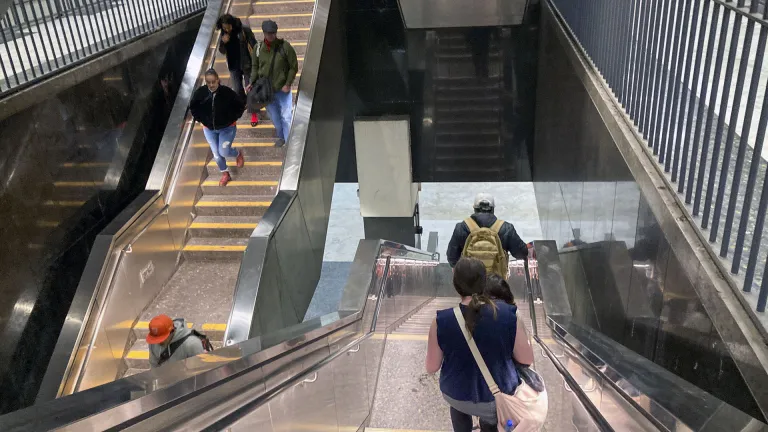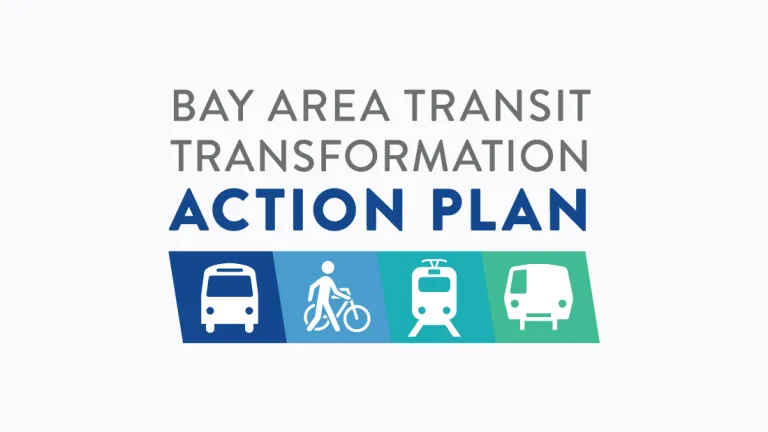Transit Fare Coordination & Integration
MTC is partnering with Bay Area transit agencies and county transportation agencies to improve transit fare policies and make the Bay Area's transit network better coordinated and more affordable.
As the Bay Area’s transportation planning, financing and coordinating agency, MTC supports regional efforts to make Bay Area transit simpler, easier to use and more affordable.

The Transit Transformation Action Plan aims to improve the Bay Area’s public transportation network to create a more user-friendly and connected system. It identifies key targets and actions to make this vision a reality.

In July 2021, MTC’s Blue Ribbon Transit Recovery Task Force approved a set of 27 actions – the Transit Transformation Action Plan – to reshape the Bay Area’s transit system into a more connected, more efficient and more user-focused mobility network. Improving transit fare policy in the Bay Area is one of the cornerstones of achieving transit transformation.
The Bay Area Transit Fare Coordination & Integration Study & Business Case looked at ways to make the region's transit network better coordinated and more affordable.
The study also examined how the coming Clipper® upgrade (known as Clipper 2) can provide new fare products that better meet the needs of transit users. Clipper 2 will replace the two-decade old technology that runs the Bay Area's current Clipper fare payment system.
Based on the study’s findings, the Fare Integration Task Force adopted a Fare Coordination/Integration Policy Vision Statement in November 2021.
Fare Coordination/Integration Policy Vision
The Fare Coordination/Integration Policy Vision supports equity goals for MTC, transit operators, local stakeholders and the State of California. Better coordinated and integrated transit fare policies may offer:
- Cost-effective options for improving the transit customer experience
- Transit ridership recovery from the COVID-19 pandemic
- A reduction in regional vehicle miles traveled, greenhouse gas emissions and transit travel times for customers
Actions & Work Plan Activities
MTC is working with transit operators to advance several policy initiatives endorsed by the Fare Integration Task Force, including these three priority actions:
All-Transit Institutional Pass (Clipper BayPass)
Institutional transit pass programs allow employers, schools and other organizations to buy all-you-can-ride passes for their employees or students. These programs reduce price barriers for recipients, and can help to increase transit ridership.
MTC's two-phase Clipper BayPass pilot program gives riders unlimited access to all public transit agencies in the Bay Area.
Phase 1 of the pilot program provides more than 30,000 Bay Area selected residents (students and residents of several affordable housing communities) with unlimited access to all bus, rail and ferry services in the Bay Area for a two-year period to study the impact of a single transit pass. Launched in August 2020, early results from Phase 1 show that Clipper BayPass users take an average of 35% more trips than their peers, with pass recipients taking more than a combined 2 million transit trips through June 30, 2023.
Phase 2 of the pilot program launched in December 2023, expanding the Clipper BayPass program to up to 10 additional institutions or employers. The goal of Phase 2 is to generate additional data and determine if an employer/institutional pass could be rolled out on a wide scale across the Bay Area in the future.
No-Cost & Reduced Cost Transfers Pilot Program
Today, inconsistent fare structures and transfer policies across Bay Area transit agencies can discourage people from taking transit trips that involve multiple transit operators.
No-cost and reduced cost transfers offer a more seamless experience for riders: treating connections between multiple agencies as though they are connections within a single agency.
MTC is working with transit agencies to implement a pilot program for no-cost and reduced cost transfers for transit riders who use two or more transit agencies. When making a trip that requires transferring between transit agencies, customers using Clipper will pay the full fare for just the first agency. Any transfer to a different agency within two hours will be discounted.
The transfer pilot program will launch with the rollout of the next generation Clipper system (Clipper 2), currently scheduled for summer 2024.
Evaluate a Common Regional Fare Structure
Building on the work of the Fare Coordination & Integration Study & Business Case, MTC will continue working with transit agencies and county transportation agencies to refine the vision for creating a common fare structure for regional rail, ferry and express bus service after the rollout of the next generation Clipper system (Clipper 2).
MTC and transit agency staff are continuing to evaluate:
- The benefits and costs of a common fare structure for regional transit services in the context of a broader evaluation of post-COVID-19 pandemic ridership patterns;
- The role of regional transit service in the region; and
- The funding strategy for these regional transit services.
This work will be informed by evaluations of the Clipper BayPass and No-Cost & Reduced Cost Transfer Policy pilot programs.
Staff Contacts
William Bacon, MTC
Phone: 415-778-6628
Email: WBacon@bayareametro.gov
Michael Eiseman, BART
Phone: 510-464-6435
Email: MEisema@bart.gov
Early results from the Clipper BayPass pilot program show improved regional mobility, and that these riders take more transit trips compared to their peers.
Upcoming
- Summer 2024: Next Generation Clipper system (Clipper 2) to launch with no-cost and reduced cost transfer pilot
Milestones
- May 2020 to September 2021: Fare Coordination & Integration Study
- November 2021: Fare Integration Task Force adopts the Fare Policy Vision Statement
- August 2022: Clipper BayPass pilot (Phase 1) launches at University of California Berkeley, San Francisco State, San Jose State University and Santa Rosa Junior College
- October 2022: Clipper BayPass pilot (Phase 1) launches at MidPen Housing sites
- March 2023: Fare Integration Task Force endorses the no-cost and reduced cost transfer pilot proposal, which would launch with the rollout of the Next Generation Clipper system (Clipper 2) in Summer 2024
- December 2023: Clipper BayPass pilot (Phase 2) launched for institutional participants
History
Regional efforts to promote fare coordination and integration have spanned decades, including the 2008 Transit Fare Coordination & Integration Study. Creating a common fare structure for Bay Area transit has been challenging due to the complex nature of existing fare policies and the desire to avoid revenue loss that would negatively impact transit service.
The Fare Integration Task Force was established in early 2020 to oversee the Transit Fare Coordination & Integration Study, and continues to oversee programs and policies related to transit fare integration and coordination.
Partnership
The Fare Integration Task Force is co-managed by staff from MTC and BART, and includes representatives from the following agencies:
- AC Transit
- Caltrain
- County Connection
- Golden Gate Transit
- Muni
- Napa Valley Transportation Authority
- SamTrans
- Solano County Transit
- Solano Transportation Authority
- VTA

